初中英语知识点总结:现在完成时
初中英语现在完成时的知识点归纳
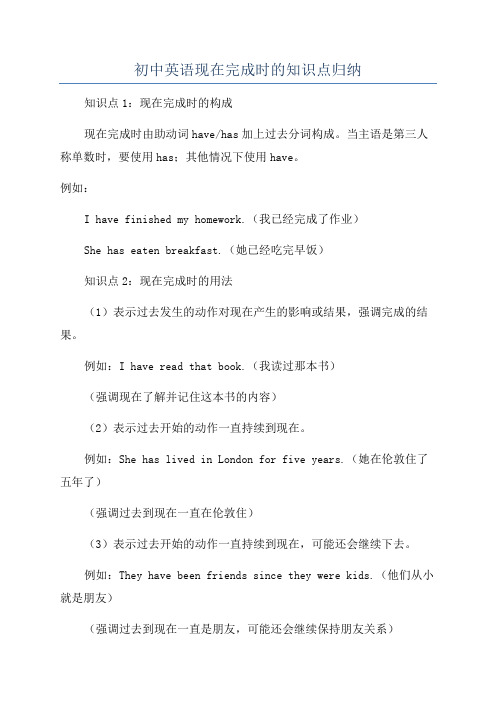
初中英语现在完成时的知识点归纳知识点1:现在完成时的构成现在完成时由助动词have/has加上过去分词构成。
当主语是第三人称单数时,要使用has;其他情况下使用have。
例如:I have finished my homework.(我已经完成了作业)She has eaten breakfast.(她已经吃完早饭)知识点2:现在完成时的用法(1)表示过去发生的动作对现在产生的影响或结果,强调完成的结果。
例如:I have read that book.(我读过那本书)(强调现在了解并记住这本书的内容)(2)表示过去开始的动作一直持续到现在。
例如:She has lived in London for five years.(她在伦敦住了五年了)(强调过去到现在一直在伦敦住)(3)表示过去开始的动作一直持续到现在,可能还会继续下去。
例如:They have been friends since they were kids.(他们从小就是朋友)(强调过去到现在一直是朋友,可能还会继续保持朋友关系)知识点3:现在完成时的时间状语现在完成时常与以下时间状语连用:just(刚刚)、already(已经)、never(从来没有)、ever(曾经)、yet(还、仍然)、recently (最近)、since(自从)、for(持续了多久)等。
例如:I have just finished my homework.(我刚刚完成了作业)Have you ever been to America?(你去过美国吗?)They haven't seen each other since last year.(他们自从去年就没有见过面了)知识点4:现在完成时与一般过去时的区别现在完成时强调的是过去的动作对现在的影响或结果,而一般过去时只表示过去发生的动作或状态。
例如:He has lost his key.(他丢了钥匙,结果是他现在找不到)He lost his key.(他丢了钥匙)知识点5:现在完成时否定句和疑问句的构成现在完成时的否定句和疑问句构成是在助动词have/has之后加not 或否定词,疑问句将助动词have/has提到句首。
初中英语知识点归纳现在完成时的构成与用法

初中英语知识点归纳现在完成时的构成与用法现在完成时是英语中的一个重要时态,表示动作或状态从过去某个时间点开始一直延续到现在或具有与现在相关的结果。
下面是现在完成时的构成与用法的归纳:一、构成:现在完成时由助动词“have/has”和过去分词构成。
其中,have用于第一人称(I/we/you/they),has用于第三人称(he/she/it)。
二、用法:1. 表示过去发生的动作对现在造成的影响或结果。
例如:- I have lost my keys.(我把钥匙丢了,现在找不到了。
)- We have finished our homework.(我们已经完成了作业。
)2. 表示过去开始的动作一直延续到现在。
例如:- She has lived here for 10 years.(她在这里住了十年了。
)- They have known each other since childhood.(他们从小就认识彼此。
)3. 表示过去发生的动作在过去的某个时间结束,但对现在仍然有影响。
例如:- He has studied English for three hours.(他学习英语已经三个小时了,仍在学习。
)- They have been friends since they met in high school.(自从高中认识以来,他们一直是朋友。
)4. 表示过去发生的动作在过去的某个时间结束,且不再持续到现在。
例如:- I have seen that movie before.(我以前看过那部电影。
)- She has already eaten lunch.(她已经吃过午饭了。
)5. 现在完成时经常与表示时间的状语连用,如already(已经)、just(刚刚)、never(从未)、ever(曾经)、yet(还)等。
例如:- Have you ever been to Beijing?(你曾经去过北京吗?)- They have just arrived.(他们刚刚到达。
初二英语英语现在完成时知识点总结及答案解析

初二英语英语现在完成时知识点总结及答案解析一、初中英语现在完成时1.—How many letters you to your mother?—109 in all, since 2016.A. has, writtenB. have, writtenC. did, writeD. are, writing 【答案】 B【解析】【分析】句意:——你给你妈写了多少封信?——从2016年起,总共109封。
句中since 2016是现在完成时态常用的时间状语,其结构是主语+have/has+动词过去分词,且主语是you,则应填写have written,故答案选B。
【点评】考查动词的时态。
注意现在完成时的用法。
2.Mike used to be a top student, but he behind since he lost himself in computer games.A. fellB. has fallenC. wasD. has been【答案】 D【解析】【分析】句意为“Mike过去是尖子生,但自从迷上电子游戏以来成绩落后了”。
由since可知but后的主句用现在完成时,瞬间动词fall不能和since引导的时间状语从句连用,故用延续性动词be。
故选D。
【点评】本题考查现在完成时中非延续性动词和延续性动词的转换。
3.Great changes in my hometown in the last few years.A. took placeB. will take placeC. have taken placeD. have been taken place 【答案】C【解析】【分析】句意:过去几年我的家乡发生了巨大的变化。
in the last few years意为“在过去的几年里”,用于现在完成时;take place“发生”没有被动语态。
故答案选C。
【点评】考查现在完成时。
初中英语现在完成时知识点
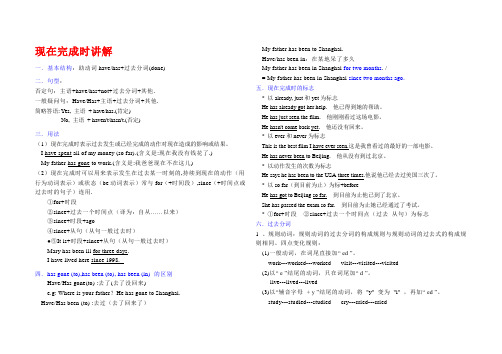
现在完成时讲解一.基本结构:助动词have/has+过去分词(done)二.句型:否定句:主语+have/has+not+过去分词+其他.一般疑问句:Have/Has+主语+过去分词+其他.简略答语: Yes, 主语+ have/has.(肯定)No, 主语+ haven't/hasn't.(否定)三.用法(1)现在完成时表示过去发生或已经完成的动作对现在造成的影响或结果。
I have spent all of my money (so far).(含义是:现在我没有钱花了.)My father has gone to work.(含义是:我爸爸现在不在这儿)(2)现在完成时可以用来表示发生在过去某一时刻的,持续到现在的动作(用行为动词表示)或状态(be动词表示)常与for(+时间段),since(+时间点或过去时的句子)连用.①for+时段②since+过去一个时间点(译为:自从……以来)③since+时段+ago④since+从句(从句一般过去时)●⑤It is+时段+since+从句(从句一般过去时)Mary has been ill for three days.I have lived here since 1998.四.has gone (to),has been (to), has been (in) 的区别Have/Has gone(to) :去了(去了没回来)e.g: Where is your father?He has gone to Shanghai.Have/Has been (to) :去过(去了回来了)My father has been to Shanghai.Have/has been in:在某地呆了多久My father has been in Shanghai for two months. /= My father has been in Shanghai since two months ago.五.现在完成时的标志* 以already, just和yet为标志He has already got her help.他已得到她的帮助。
外研版英语【初中英语】现在完成时知识点(大全)

外研版英语【初中英语】现在完成时知识点(大全)一、初中英语现在完成时1.—I haven't seen your grandfather for two years. What happened to him?—Oh, he ________ here for two years.A. stayedB. hasn't stayedC. staysD. hadn't stayed【答案】 B【解析】【分析】答语中的for two years是一段时间,用在现在完成时的句中时。
现在完成时的结构:主语+have/ has +过去分词。
可知选B。
【点评】考查现在完成时2.All the skirts .They very well.A. sold out;are soldB. sell out;have soldC. have been sold out;sellD. have sold out;sell【答案】C【解析】【分析】句意:所有的裙子都卖完了,他们非常畅销。
第一空sell out“卖完”,强调裙子已经被卖完的状态,本句用现在完成时的被动语态:has/have+been+过去分词,sell 的过去分词为sold;第二空sell作“销售”解释时用主动语态,在此处表一直卖得很好的状态,用一般现在时。
故选C。
【点评】本题考查一般现在时和现在完成时的被动语态,注意sell的不同语态和用法。
3.The volunteers ________ a lot of help to the old and the young since 2010.A. offeredB. have offeredC. are offeringD. will offer【答案】 B【解析】【分析】考查时态.句意"自2010以来,志愿者们向老人和青年提供了大量的帮助.".A过去时.B现在完成时态.C现在进行时态.D一般将来时态.since+点时间通常用于现在完成时态,结构是have/has+动词的过去分词,主语是volunteers复数,用助动词have.offer的过去分词是offered.答案是B.4.My father ____ in a panda protection center for 10 years, so he knows a lot about panda.A. was workingB. is workingC. has workedD. will work【答案】 C【解析】【分析】句意:我父亲在熊猫保护中心工作了10年,所以他对熊猫很了解。
初中英语现在完成时讲解全(共24张PPT)

I studied English ten years ago.
(come来到某地….
left the team
has been on C.
表示动作发生在过去,对现在造成的影响。
)
be over
went to bed
填空使用for和since
Tom ___for several hours.
表示动作发生在过去,对现在造成的影响。
• She has lived here ______1996.
• 2 标准词:so far/up to now (到目前为止) ;lately/recently(最近)
• Up to now/So far ,I haven’t been successful.
• Lately/Recently,I haven’t seen my teacher.
3. He bought the motorbike a month ago.
---He ____ ____ the motorbike for a month. 4. He arrived here three days ago.
--- He ____ ____ here since three days ago. 5. They turned off the light 2 hours ago.
(finish结束....)
be over
1.我买这本书三年了。Buy I have bought the book.
(1) I have had the book for 3 years. (2) I have had the book since 3 years ago.
了borrow He has borrow the book. (1)He has kept the book for 2 months . (2) He has kept the book since 2 months ago.
初中现在完成时知识点归纳
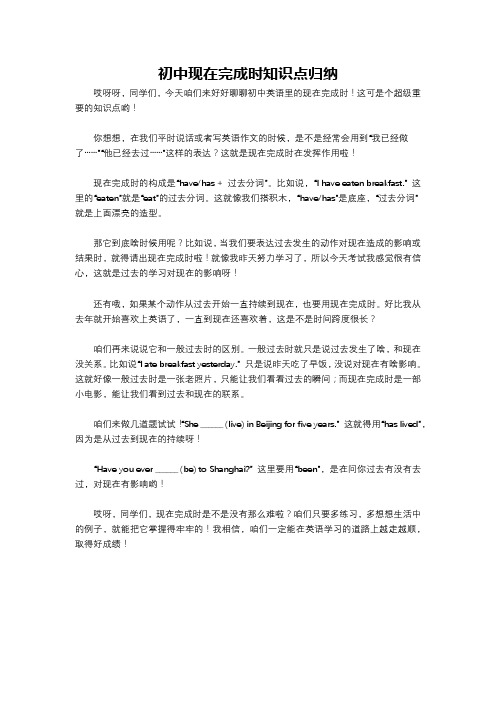
初中现在完成时知识点归纳哎呀呀,同学们,今天咱们来好好聊聊初中英语里的现在完成时!这可是个超级重要的知识点哟!你想想,在我们平时说话或者写英语作文的时候,是不是经常会用到“我已经做了……”“他已经去过……”这样的表达?这就是现在完成时在发挥作用啦!现在完成时的构成是“have/has + 过去分词”。
比如说,“I have eaten breakfast.” 这里的“eaten”就是“eat”的过去分词。
这就像我们搭积木,“have/has”是底座,“过去分词”就是上面漂亮的造型。
那它到底啥时候用呢?比如说,当我们要表达过去发生的动作对现在造成的影响或结果时,就得请出现在完成时啦!就像我昨天努力学习了,所以今天考试我感觉很有信心,这就是过去的学习对现在的影响呀!还有哦,如果某个动作从过去开始一直持续到现在,也要用现在完成时。
好比我从去年就开始喜欢上英语了,一直到现在还喜欢着,这是不是时间跨度很长?咱们再来说说它和一般过去时的区别。
一般过去时就只是说过去发生了啥,和现在没关系。
比如说“I ate breakfast yesterday.” 只是说昨天吃了早饭,没说对现在有啥影响。
这就好像一般过去时是一张老照片,只能让我们看看过去的瞬间;而现在完成时是一部小电影,能让我们看到过去和现在的联系。
咱们来做几道题试试!“She ______ (live) in Beijing for five years.” 这就得用“has lived”,因为是从过去到现在的持续呀!“Have you ever ______ (be) to Shanghai?” 这里要用“been”,是在问你过去有没有去过,对现在有影响哟!哎呀,同学们,现在完成时是不是没有那么难啦?咱们只要多练习,多想想生活中的例子,就能把它掌握得牢牢的!我相信,咱们一定能在英语学习的道路上越走越顺,取得好成绩!。
初中英语知识点时态总结

初中英语知识点时态总结初中英语时态总结一、一般现在时一般现在时表示经常发生的动作或现在存在的状态。
它由动词的原形构成,第三人称单数在词尾加-s或-es。
1. 肯定句:I usually play football on weekends.He reads books every day.2. 否定句:We do not (don't) like coffee.She doesn't watch TV in the evening.3. 疑问句:Do you speak English?Does he live here now?二、现在进行时现在进行时表示正在进行或发生的动作。
构成为be动词(am/is/are) + 动词的现在分词(ing形式)。
1. 肯定句:She is listening to music.They are playing basketball.2. 否定句:I am not (aren't) studying right now.The children are not (aren't) doing their homework.3. 疑问句:Is she cooking dinner?Are you waiting for someone?三、一般过去时一般过去时表示过去某个时间发生的动作或存在的状态。
规则动词在词尾加-ed,不规则动词则有特殊形式。
1. 肯定句:He walked to school yesterday.I visited my grandparents last week.2. 否定句:We did not (didn't) go to the cinema.She didn't buy anything at the store.3. 疑问句:Did you travel abroad last year?Did he finish his homework?四、过去进行时过去进行时表示过去某个时间点正在进行的动作。
初中英语知识点总结:现在完成时

知识点总结现在完成时指的是过去发生并且已经完成的动作对现在造成影响或后果,过去某一时间开始并一直持续到现在并且有可能还会持续的动作或状态。
一、基本结构:主语+have/has+动词的过去分词①肯定句:主语+have/has+动词的过去分词+宾语.②否定句:主语+have/has+not+动词的过去分词)+宾语.③一般疑问句:Have/Has+主语+动词的过去分词+宾语.④特殊疑问句:特殊疑问词或词组+一般疑问句(have/has+主语+过去分词(V-ed)+其他)过去分词变化规则如下:1 、规则动词:规则动词的过去分词的构成规则与规则动词的过去式的构成规则相同。
四点变化规则:(1)一般动词,在词尾直接加“ ed ”。
work---worked---worked ,visit---visited---visited(2)以“ e ”结尾的动词,只在词尾加“ d ”。
live---lived---lived ,(3)以“辅音字母+ y ”结尾的动词,将"y" 变为"i" ,再加“ ed ”。
study---studied---studied ,cry---cried---cried(4)重读闭音节结尾,末尾只有一个辅音字母,先双写该辅音字母,再加“ ed ”。
stop---stopped---stopped , drop---dropped--dropped2 、不规则动词变化需参看不规则动词表逐一熟记。
例如; cut- cut- cut,hit-- hit-- hit.二、用法1 、现在完成时用来表示过去发生或已经完成的动作对现在造成影响或后果。
也就是说,动作或状态发生在过去但它的影响现在还存在,强调的是现在。
例如:I have already posted the photo.我已经把照片寄走了。
强调post对现在的影响“照片不在这里”。
2、现在完成时可以用来表示发生在过去某一时刻的,持续到现在的动作(用行为动词表示)或状态(be动词表示),常与for(+时间段),since(+时间点或过去时的句子)连用.谓语动词必须是延续性动词。
初中英语语法_现在完成时讲解以及练习题

页眉内容现在完成时1.构成现在完成时是由助动词 have(has)+动词的过去分词构成。
助动词have(has)表明事情发生于现在。
它和主语的人称、数要保持一致。
过去分词在句子中做谓语,说明句子的含义。
2.用法(1)动作发生在过去某个不确定的时间,但对现在有某种影响和结果。
常被just、already、yet 等副词修饰。
如:-Have you had lunch yet? -Yes,I have. I've just had it.你(已经)吃午饭了吗?我刚刚吃过。
(现在我不饿了)(2)表示从过去某一时刻开始一直持续到现在的动作或状态。
这个动作可能刚停止,可能仍然在进行。
常带有for和since等表示一段时间的状语。
如:He has taught here since 1981他自1981年就在这儿教书。
(可能还要继续教)I have't seen her for four years.我有四年没见到她了。
(3)表示说话前发生过一次或多次的动作,现在成为一种经验,一般译为汉语“过”,常带有twice,ever,never,three times等时间状语。
如: I have been to Beijing twice.我去过北京二次。
3.现在完成时的时间状语(1)现在完成时属于现在时范围,故不能和过去的时间状语连用。
如:yesterday,last Sunday,in1990,three years ago等。
但是,在强调动作产生的后果和影响时,可以和一些表示不确定的时间状语连用。
a. 用副词already和yet。
already一般用于肯定句中,yet 一般用于否定句和疑问句中。
如:We have already finished our homework.我们已完成作业了。
They haven't finished their homework yet.他们还没有完成作业。
初中英语现在完成时知识点
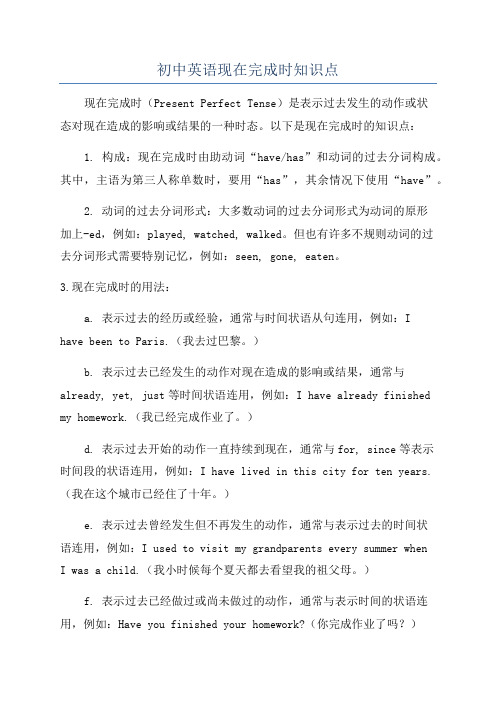
初中英语现在完成时知识点现在完成时(Present Perfect Tense)是表示过去发生的动作或状态对现在造成的影响或结果的一种时态。
以下是现在完成时的知识点:1. 构成:现在完成时由助动词“have/has”和动词的过去分词构成。
其中,主语为第三人称单数时,要用“has”,其余情况下使用“have”。
2. 动词的过去分词形式:大多数动词的过去分词形式为动词的原形加上-ed,例如:played, watched, walked。
但也有许多不规则动词的过去分词形式需要特别记忆,例如:seen, gone, eaten。
3.现在完成时的用法:a. 表示过去的经历或经验,通常与时间状语从句连用,例如:Ihave been to Paris.(我去过巴黎。
)b. 表示过去已经发生的动作对现在造成的影响或结果,通常与already, yet, just等时间状语连用,例如:I have already finished my homework.(我已经完成作业了。
)d. 表示过去开始的动作一直持续到现在,通常与for, since等表示时间段的状语连用,例如:I have lived in this city for ten years.(我在这个城市已经住了十年。
)e. 表示过去曾经发生但不再发生的动作,通常与表示过去的时间状语连用,例如:I used to visit my grandparents every summer whenI was a child.(我小时候每个夏天都去看望我的祖父母。
)f. 表示过去已经做过或尚未做过的动作,通常与表示时间的状语连用,例如:Have you finished your homework?(你完成作业了吗?)g. 表示过去未完成的动作,通常与since和for连用,表示自从过去一些时间以来一直持续到现在的动作,例如:She has been studying English since 2024.(她从2024年起一直在学习英语。
【英语知识点】初中英语现在完成时常考知识点

【英语知识点】初中英语现在完成时常考知识点①肯定句:主语+have/has+动词的过去分词;②否定句:主语+have/has+not+动词的过去分词;③一般疑问句:Have/Has+主语+动词的过去分词;④特殊疑问句:特殊疑问词+一般疑问句(have/has+主语+过去分词)。
1、考查现在完成时的构成这一点相对比较简单,大家只要记住,现在完成时是由助动词have/has加动词过去分词。
除了当主语是第三人称单数的时候用has,其余都用have。
2、考查现在完成时的基本用法现在完成时的基本用法有两种,一种是表示一个动作发生在过去并且终止于过去,强调这个动作对现在造成的影响多结果。
3、考查延续性动词与非延续性动词延续性动词和非延续性动词都可以用于现在完成时,但非延续性动词用于现在完成时的时候,一般不能与表示一段时间的状语连用,除了其否定形式。
而延续性动词可以与for加一段时间连用,或者是since加时间点等。
1.共同点:动作都是在过去完成。
例:I saw the film yesterday evening.I have seen the film before.(看电影这件事都是在过去完成的。
)2.不同点:①现在完成时强调过去发生的动作对现在的影响和结果,而一般过去时与现在没有联系,只是说明某个动作发生的时间是在过去。
②一般过去时通常与具体明确的过去时间状语连用。
如yesterday, last week , two years ago,just now,in 2002 等;而现在完成时则常与 just ,already ,ever ,never 等模糊的过去时间状语和 these days ,this week ,since..., for... 等表示一段时间的状语连用。
感谢您的阅读,祝您生活愉快。
初中英语语法——现在完成时知识点总结归纳
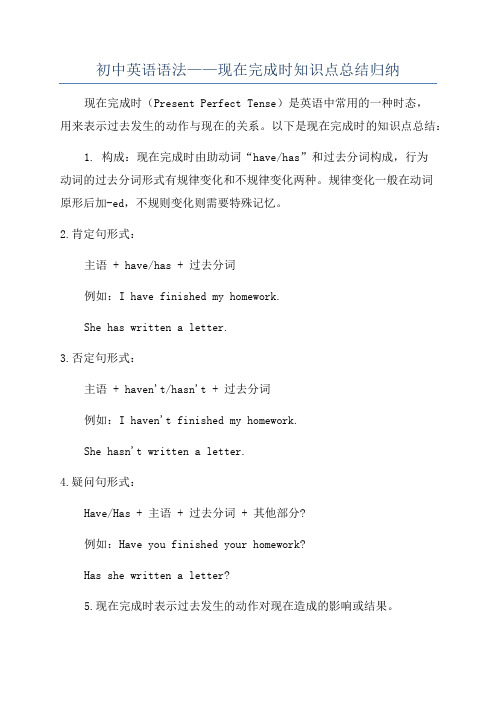
初中英语语法——现在完成时知识点总结归纳现在完成时(Present Perfect Tense)是英语中常用的一种时态,用来表示过去发生的动作与现在的关系。
以下是现在完成时的知识点总结:1. 构成:现在完成时由助动词“have/has”和过去分词构成,行为动词的过去分词形式有规律变化和不规律变化两种。
规律变化一般在动词原形后加-ed,不规则变化则需要特殊记忆。
2.肯定句形式:主语 + have/has + 过去分词例如:I have finished my homework.She has written a letter.3.否定句形式:主语 + haven't/hasn't + 过去分词例如:I haven't finished my homework.She hasn't written a letter.4.疑问句形式:Have/Has + 主语 + 过去分词 + 其他部分?例如:Have you finished your homework?Has she written a letter?5.现在完成时表示过去发生的动作对现在造成的影响或结果。
例如:I have lost my key.(我丢失了我的钥匙,现在找不到了。
)He has broken his leg.(他折断了腿,现在不能走路。
)6.现在完成时还可以用来表示一直延续到现在的动作或状态。
例如:I have lived in this city for five years.(我已经在这个城市住了五年了。
)She has known him since high school.(她从高中就认识他了。
)7.现在完成时与时间状语的连用:现在完成时通常与以下时间状语连用:just(刚刚)、already(已经)、yet(还)、ever(曾经)、never(从未)、recently(最近)、since(自从)、for(持续时间)例如:I have just finished my homework.(我刚完成了作业。
初中英语语法——现在完成时知识点总结归纳

初中英语语法——现在完成时知识点总结归纳(总5页)--本页仅作为文档封面,使用时请直接删除即可----内页可以根据需求调整合适字体及大小--初中英语语法——现在完成时知识点总结归纳现在完成时构成:主语+助动词have, has+过去分词用法:1) 表示过去发生的和现在有某种联系的动作,常和just, usually, already, since等时间副词连用。
I have just had lunch. (饱了,不用再吃了。
)He has had a cup of tea.(不渴了,不用再喝。
)They have already had their holiday. (不能再度假了。
)The boy has already read the book. (已经知道书的内容了,不用再看了。
)2) 询问别人是否做过某事一般用现在完成时:Have you finished your homework?Have you been to BeijingHave he seen the film?3) 表示开始于过去并持续到现在的动作I have lived in Beijing for twenty years.I have worked for this school for 1 year.4) 表示一种经历,经验:去过…地方,做过…事情,经历过…事情I have never had a bath.I have never seen a film.I have never been to cinema.I have ever been to Paris.Have been to表示去过,have gone to 表示去了I have been to London.(人已经回来)He has gone to London.(人还在那里)5) 表示一种结果,一般不和时间副词联用I have lost my pen.I have hurt myself.He has become a teacher.She has broken my heart.句型变化:★变疑问句将助动词移到句首,变否定句在助动词后面加not.Have you lost your pen I have not lost my pen.★肯定回答及否定回答Yes, I have. / No, I have not.★特殊疑问句What have you done?What has he done?一般过去时与现在完成时的区别:凡是有明确的表示过去的时间状语的句子为过去时。
初中英语现在完成时知识点总结
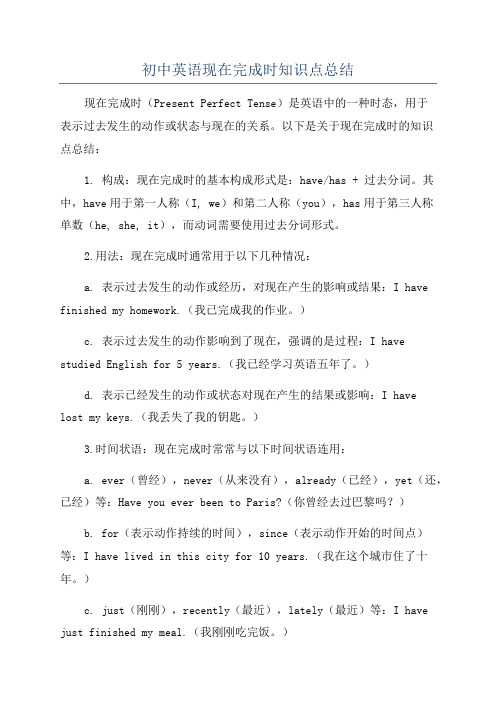
初中英语现在完成时知识点总结现在完成时(Present Perfect Tense)是英语中的一种时态,用于表示过去发生的动作或状态与现在的关系。
以下是关于现在完成时的知识点总结:1. 构成:现在完成时的基本构成形式是:have/has + 过去分词。
其中,have用于第一人称(I, we)和第二人称(you),has用于第三人称单数(he, she, it),而动词需要使用过去分词形式。
2.用法:现在完成时通常用于以下几种情况:a. 表示过去发生的动作或经历,对现在产生的影响或结果:I have finished my homework.(我已完成我的作业。
)c. 表示过去发生的动作影响到了现在,强调的是过程:I have studied English for 5 years.(我已经学习英语五年了。
)d. 表示已经发生的动作或状态对现在产生的结果或影响:I havelost my keys.(我丢失了我的钥匙。
)3.时间状语:现在完成时常常与以下时间状语连用:a. ever(曾经),never(从来没有),already(已经),yet(还,已经)等:Have you ever been to Paris?(你曾经去过巴黎吗?)b. for(表示动作持续的时间),since(表示动作开始的时间点)等:I have lived in this city for 10 years.(我在这个城市住了十年。
)c. just(刚刚),recently(最近),lately(最近)等:I have just finished my meal.(我刚刚吃完饭。
)d. so far(到目前为止),up to now(到现在为止),since then (从那时起)等:He has been to many countries so far.(他到目前为止去过很多国家。
)4.注意事项:b. 如果句子中有明显的表示过去的时间状语,应使用过去式而不是现在完成时。
初中英语时态知识点:现在完成时连用的时间状语

Wehavelivedinthiscitysince1958.我们从1958年起就住在这个城
市里。
从以上两个例句我们可以看出,与表示一段时间的状语连用时,谓语
动词常为stay,live,teach,learn,work,sleep,read,wait,keep等具有延续意义的
动词。
2.与笼统地表示过去的时间状语连用,如already,never,ever,just
初中英语时态知识点:现在完成时连用的时间状语
现在完成时是一个与过去和现在都有关系的时态,因此,具有这样时
间特点的状语都可以与现在完成时连用。
1.与表示一段时间的状语43;时间点。如:
Wehavelivedinthiscityformorethan40years.我们在这个城市已生
recently,inthepastfewyears,thesefewyears,thesedays,uptonow,sofar等。
如:
Howhaveyoubeenrecently?你近来状况如何?
Thefamouswriterhaswrittenanewbookinthepasttwoyears.那位着
等。如:
I'vejustfoundthislibrarybook.我刚刚找到这本图书馆的书。
Howbeautifullyshesings!Ihaveneverheardabettervoice.她唱得多美
啊!我还从来没听到过比这更优美的歌喉。
3.与表示包含过去和现在的一整段时间的状语连用,如lately,
名的作家在过去两年时间里写了一本新书。
Haveyouseenherparentsthesedays?这些天你看见她的父母了吗?
中考英语现在完成时知识点总结
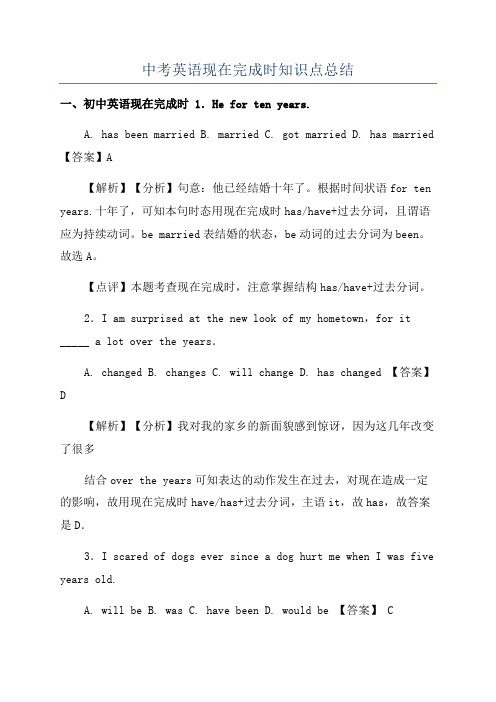
中考英语现在完成时知识点总结一、初中英语现在完成时 1.He for ten years.A. has been marriedB. marriedC. got marriedD. has married 【答案】A【解析】【分析】句意:他已经结婚十年了。
根据时间状语for ten years.十年了,可知本句时态用现在完成时has/have+过去分词,且谓语应为持续动词。
be married表结婚的状态,be动词的过去分词为been。
故选A。
【点评】本题考查现在完成时,注意掌握结构has/have+过去分词。
2.I am surprised at the new look of my hometown,for it_____ a lot over the years.A. changedB. changesC. will changeD. has changed 【答案】D【解析】【分析】我对我的家乡的新面貌感到惊讶,因为这几年改变了很多结合over the years可知表达的动作发生在过去,对现在造成一定的影响,故用现在完成时have/has+过去分词,主语it,故has,故答案是D.3.I scared of dogs ever since a dog hurt me when I was five years old.A. will beB. wasC. have beenD. would be 【答案】 C【解析】【分析】由since引导的从句可知主句应用现在完成时,故答案为C。
句意是:自从我五岁时被狗伤过之后我就一直怕狗。
【点评】本题考查现在完成时的用法。
4.—How do you like Treasure Island,Lucy?—It's so e某citing that I _______ it twice.A. am readingB. have readC. was readingD. had read 【答案】B【解析】【分析】句意:,露西,你认为《金银岛》怎么样?,它是如此令人激动以至于我读了两次。
(完整版)初中英语现在完成时语法总结

一、Topic:现在完成时
二、lead in:一般现在时(经常性动作或状态;客观事实或真理)
现在进行时(正在进行的动作或持续的状态)
一般过去时(过去发生的,或过去经常性动作,回忆过去)
过去进行时(过去正在发生的动作或状态)
一般将来时(将来动作,将来经常性动作,打算或即将发生的动作/状态)
2.(2016选词填空)Al.o.u.hav.passe.th.exam.Ho.happ.w.are!
3.(2015选词填空)—Where are you going on vacation this summer?
-- Ihaven’t plannedit yet.
[already与yet的用法: already常用语肯定句中,在助动词have/has之后;yet常用于疑问句、否定句中,句末位置。含already的陈述句变为疑问句或否定句时,already改为yet,放句末。]
六、附录:延续性动词转换标
Borrow--keep
Buy—have
Catch a cold—have a cold
Put on--wear
Get toknow--know
Get to sleep--sleep
Begin/start—be on
Go out—be out
Get to/arrive in/reach—be (in)
1.I___.alread.___.(see.th.film.._______.(s.week.
2.____.h.___.(finish.hi.wor.today.No.yet.
3.M.fathe.___.jus.___.(come.bac.fro.work.H.i.tire.now.
- 1、下载文档前请自行甄别文档内容的完整性,平台不提供额外的编辑、内容补充、找答案等附加服务。
- 2、"仅部分预览"的文档,不可在线预览部分如存在完整性等问题,可反馈申请退款(可完整预览的文档不适用该条件!)。
- 3、如文档侵犯您的权益,请联系客服反馈,我们会尽快为您处理(人工客服工作时间:9:00-18:30)。
xx知识点总结:
现在完成时
(1)现在完成时表示某个动作发生在过去,但对现在有影响(或结果),这个动作或状态可能已经结束,也可能还要持续下去。
其构成形式是:
have/ has +动词过去分词
否定句在have/ has 后加not→haven’t/ hasn’t
疑问句要将have/ has放到主语之前。
(2)现在完成时的用法。
①表示过去发生的动作对现在造成的影响和结果。
常用的时间状语有:
already, yet, ever, never, just等。
如:
I have already finished the work.
Have you ever been to Beijing?
He has never seen such a nice car.
②表示过去已经开始,持续到现在的动作或状态。
往往和表示一段时间的状语连用。
如:
for +时间段;
since +时间点(表时间段);时间段+ago;一般过去时态。
如:
I have taught in this school for ten years.
I have taught in this school since ten years ago.
③for和since引导的短语都表示“一段时间”,所以谓语动词应该用延续性动词,不能用非延续性动词。
延续性动词表示该动词可以延续一段时间,如:
live, work, study, teach, stay等,非延续性动词是指该动词所表示的动作不能持续,是短暂的、瞬间完成的,如:
许多非延续性动词可以用意思相同或相近的延续性动词来表示:
leave ---- be away from
go ---- be away
buy ---- have arrive ---- be in
borrow ---- keep die ---- be dead
join ---- be in/be a member of
如:
He has gone begin ---- be on
He has been away for an hour
I have bought a watch I have had the watch for several days ④have/ has been to 和have/ has gone to
have/ has been to :
曾去过
have/ has gone to :
已去,去了(不在说话现场,在途中或已经到达)My mother has been to America.我妈妈曾经去过美国
My mother has gone to America.我妈妈已经去了美国
(3)现在完成时与一般过去时的用法比较
①一般过去时只单纯表示过去,和现在不发生联系,它可以和确定的表示过去的时间状语连用。
而现在完成时表示某一完成的动作对现在造成的影响或结果,强调的是现在的情况,所以不能和确定的过去的时间状语连用。
如:
We have visited the farm(现在对农场有所了解)
We visited the farm last week(说明上周参观农场这件事)
②如果询问某事发生的时间、地点只能用一般过去时。
如:
When did you lose your cat ?I lost it last night.
现在完成时难点:
I found it in the garden.
①由since引导的时间状语,它们的主句通常使用完成时态。
He has taught English since 1970.
It has been a long time since I last saw you.
②只有在It is …since…这种结构中,主句的谓语才可用一般现在时,现在完成时或一般过去时。
如:
It’s ten years since I left school.
It’s a long time since I saw you last.
③表示短暂性的动词不能与表示一段时间的状语连用,这类动词有:
不能说:
His father has died for three years.
只能说:
His father died three years ago.
不能说:
He has left home for two months.
只能说:
He left home two months ago.
④非延续性动词的否定形式可以表示状态的延续。
可与for, since时间状语连用。
如:
I haven’t seen him fo r a long time.
I haven’t heard from him since he left.
She hasn’t left home ever since she lost her job.⑤have(has) been 和have (has) gone的区别。
Have been to a place意思是“到过、去过”,表示曾到过某处,但现在人不在那儿;have gone to意思是“去了”,表示已经去了某地,现在人可能在去的途中或已在那儿。
如:
Has she ever been to Nanjing ?
You have never been there before, have you?
I have been to Guilin, I went there last year.
总之,have been to讲的是过去的情况,强调去过或没有,着重于到目前为止的一个结果,而have gone to指现在人在不在,只用于第三人称,不用于第一、第二人称,不能用来代替have been to.。
